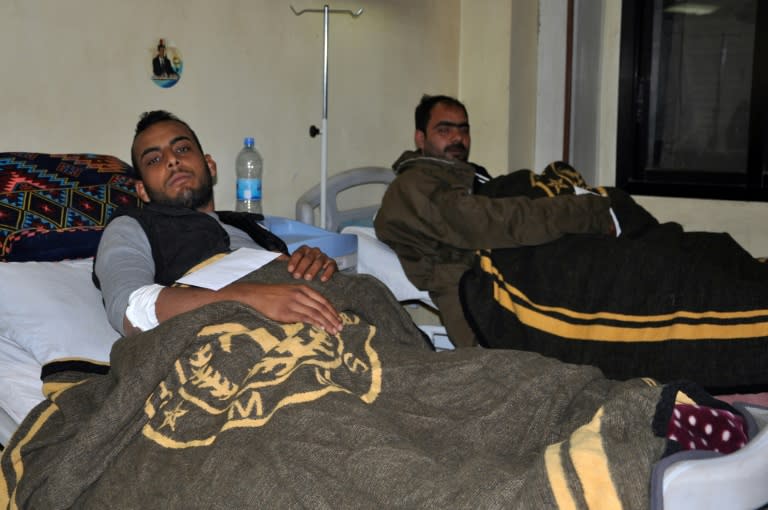Air strikes batter Syria rebel enclave for fifth day
Fresh bombardment hit the Syrian rebel enclave of Eastern Ghouta on Friday, AFP correspondents reported, the fifth straight day of a bombing campaign that has killed more than 240 civilians. Syrian warplanes and artillery have battered the enclave's towns since Monday, trapping thousands of families in makeshift bomb shelters and overwhelming rescue workers. World powers failed to back an appeal by UN officials for a month-long ceasefire to allow for desperately needed aid deliveries and medical evacuations. Bombardment resumed on several Eastern Ghouta towns on Friday morning, killing 13 civilians, according to the Syrian Observatory for Human Rights, a Britain-based war monitor. At least six were killed in Douma, including two children. "There were eight families living in this neighbourhood," said Abu Ezzo, a 29-year-old resident of Douma. "The airplane hit the houses, and every single resident came out either wounded or dead," he said. One of the raids hit Douma's local civilian council, starting a fire on the upper levels. Multiple strikes also killed seven civilians in Erbin, where medics reported being overwhelmed by the relentless bombardment. Friday's toll was less than on previous bloody days, but it put the week's deaths at more than 240 including 60 children, according to the Observatory. - Aid workers 'all alone' - Eastern Ghouta is home to an estimated 400,000 people who have lived under crippling government siege since 2013. More than 4,000 families live in basements and bunkers for fear of air strikes. Relief organisations on Friday warned that the intensity of the air strikes was hampering life-saving aid operations. "Our partners are having a hard time moving around, so how can they reach vulnerable people?" asked Joelle Bassoul, CARE International's communications director for Syria. "If there is no ceasefire, if this is all left unheard, we cannot imagine the scale of the humanitarian disaster," she said. Mercy Corps said members of its local relief partners have been killed in bombardment in recent months. "People are dying and aid workers trying to help them are dying also. These Syrian aid workers are all alone -- they are the only ones trying to help their communities," said senior communications officer Christy Delafield. "This is a de-escalation area, but this is some of the worst violence we've seen in what's now going on eight years of conflict," she told AFP. Eastern Ghouta is ostensibly included in a "de-escalation" deal reached last year in an attempt to reduce the bloodshed. UN aid officials appealed this week for a month-long humanitarian truce to allow aid to be delivered and the sick and wounded brought out for treatment. But the Security Council on Thursday failed to support the proposal, with long-time regime ally Moscow dismissing it as "not realistic". Russia says the rebels in Eastern Ghouta are "terrorists", and has previously backed Syrian government offensives against them. - 'Unbearable deterioration' - On Friday, French President Emmanuel Macron asked his Russian counterpart Vladimir Putin to help ease civilian suffering in the enclave. Macron urged Putin "to do everything so that the Syrian regime puts an end to the unbearable deterioration in the humanitarian situation in Eastern Ghouta", a statement said. As it is last rebel-held district on the capital's doorstep, the government is more determined than ever to clear Eastern Ghouta, said Nick Heras, an analyst at the Center for New American Security. "This strategy of laying siege to the Ghouta is at its basic element a strategy of collective punishment, of making the entire population of the area suffer for its choice to rebel against Bashar al-Assad and his regime," he told AFP. Syria's conflict began with widespread protests against Assad's rule in 2011, but a crackdown on demonstrations paved the way for a complex war drawing in world powers. The US-led coalition on Thursday said it hit forces allied to the Damascus regime in eastern Syria and that at least 100 pro-regime fighters were killed. US Defence Secretary Jim Mattis said the coalition acted in self-defence after pro-Damascus forces moved on an area under the control of the US-backed Syrian Democratic Forces. The Syrian foreign ministry condemned the bombardment as a "war crime" against its forces fighting the Islamic State (IS) group, an accusation echoed by the Russian ambassador to the UN. "To confront those who really fight international terrorism on the ground in Syria is criminal," Vassily Nebenzia said. The Syrian army announced Friday that it has driven out all IS fighters who had returned to the provinces of Hama in the centre of the country and Aleppo in the north. "Syrian army units and allied forces have successfully wound up combat operations and liberated a large number of localities, villages and farms in the Hama, Aleppo and Idlib regions," the military said in a statement. The Observatory, for its part, said the army had captured more than 80 villages in a week-old operation that had expelled the jihadists.





